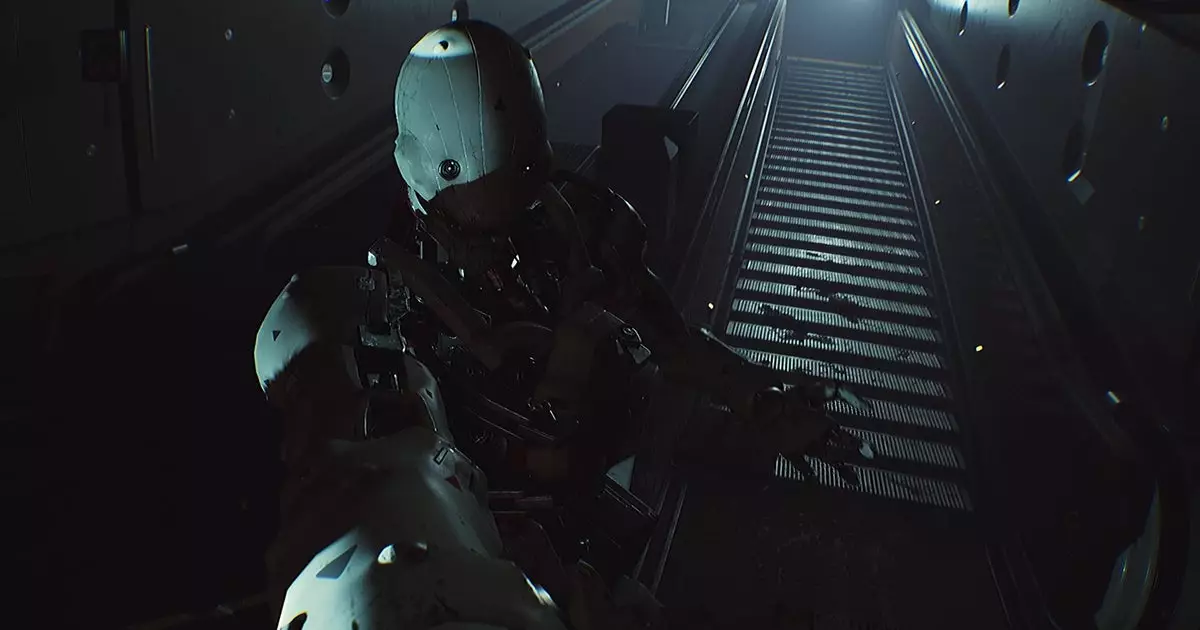The saga of Routine exemplifies a relentless pursuit of a grand vision, woven through years of silence and sporadic updates. Since its inception, Lunar Software’s ambitious homage to ‘80s sci-fi horror has drifted through the shadows of gaming development, much like its own lunar setting. This project, which first gleamed on the horizon over a decade ago, reflects a deep-rooted nostalgia for classic titles like System Shock and Dead Space, capturing a craving for atmospheric storytelling combined with tense exploration. The long wait symbolizes the indomitable spirit of indie developers committed not merely to releasing games, but to crafting experiences that echo through time, resonating with those who cherish the unpolished charm and raw authenticity of early horror titles.
The game’s vision hinges on creating a haunting lunar environment, where an abandoned space station teeters on the brink of chaos under the persistent threat of autonomous machines gone rogue. The aesthetic draws from the strikingly retro, yet eerily timeless, look of the 1980s—booming neon lights, bulky consoles, and ominous corridors filled with danger. It’s a love letter to a golden era of sci-fi, reimagined through modern sensibilities but tethered to the nostalgic roots that initially sparked its conception. The setting promises a expansive colony, complete with day-to-day hubs like malls and arcades, blending mundane human comforts with the terrifying unknown lurking in every shadowed corner.
The Long Road to Reanimation
Despite numerous setbacks, the development team’s latest communication reveals a renewed sense of purpose. Lunar Software, a small core team supported intermittently by additional contributors, has refused to surrender to the noise of industry churn. Their recent update, coinciding with their partnership with Raw Fury, demonstrates transparency in acknowledging the long sustenance required for a project of this scale. The developers emphasize that Routine remains “very much in active development” and that they are nearing the culmination of their arduous journey.
What’s particularly striking about this update is the palpable honesty about the challenges encountered along the way. Big names in the industry often promise quick turnarounds, but Routine has defied that trend by refusing to set an aggressive release date prematurely. This cautious approach, while frustrating for eager fans, serves as a testament to the developers’ integrity and commitment to quality. Their recognition of past lessons—learning from delays and overpromising—indicates a strong desire to deliver a game that lives up to its potential, rather than sacrificing polish for a rushed launch.
The Human Element in a Mechanical World
One essential component of Routine’s ongoing development has been its audio landscape. The game initially boasted Mick Gordon, renowned for his work on Doom, as its audio director. His departure due to scheduling conflicts was a disappointment, but the studio’s focus remains undeterred. The assets Mick contributed continue to influence the project, and new sound designers are stepping in with the goal of maintaining the auditory intensity that such a horror experience demands. This continuity reflects a core philosophy: even amid setbacks, the essence of the experience must remain intact.
The game’s focus on atmospheric sound design underscores its core appeal—the sense of dread and isolation fostered by a hauntingly sparse but immersive environment. Stellar audio can make or break a horror experience, and Lunar Software’s careful curation of sound will be central to elevating Routine above its peers. The space station, despite its abandoned state, is alive with sounds—distorted echoes, flickering lights, and the distant, saw-toothed sentinels that hunt its halls—creating a constant suspense that hooks players in.
The Hope That Keeps the Dream Alive
In a landscape flooded with high-budget, often predictable horror titles, Routine’s prolonged development time might seem like a liability. Yet, for those who understand the essence of true horror, it’s a badge of honor. The game’s drawn-out journey hints at a dedication to craft that can produce a more refined, thoughtful experience. It’s an indication that the developers are willing to wait for the perfect moment to unleash their vision—an act that many larger studios neglect in their rush to capitalize on trends.
Finally, there’s an inherent optimism in seeing Routine inch toward completion. Not just as a piece of entertainment, but as a labor of love rooted in pure passion for the art of horror. The game’s delayed journey might be frustrating on the surface, but it also rekindles a hope that genuine, handcrafted horror experiences still matter. When Routine finally emerges from its shadowed corridors, it might just remind the industry—and players—why patience and perseverance are worth the effort in an age obsessed with instant gratification.

